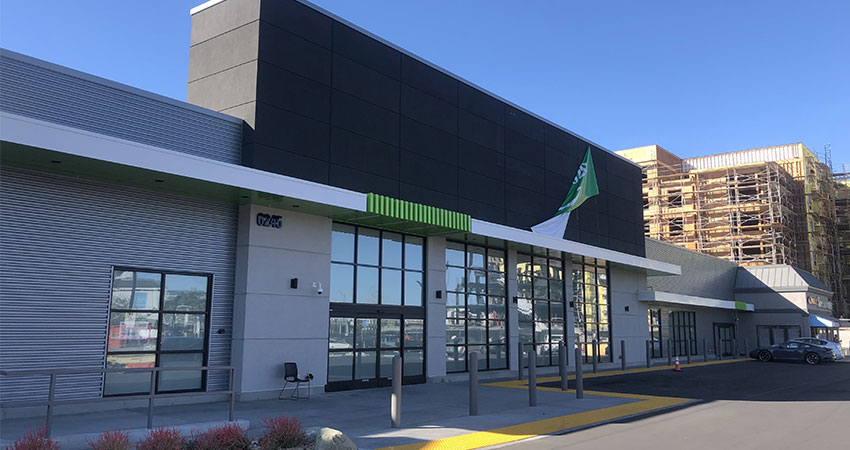Photo credit: HNGRY
Amazon is reportedly using a micro-fulfillment center solution from Dematic at its first grocery store not named Whole Foods outside Los Angeles, sending a loud signal to the rest of the market that an MFC capability is critical to success and maintaining market share in the red-hot e-grocery sector.
The story broke in Medium’s HNGRY blog, detailing plans submitted by Amazon to the city of Los Angeles planning office. The 7,200 MFC area will be located in a back section of the store, representing 21% of the 33,574-square-foot store, according to HNGRY. This is similar to a Sedano’s grocery in Miami, which has a 10,800-square-foot MFC from Takeoff Technologies that represents 18% of the store’s 60,000 square feet.
“As a matter of policy, Dematic does not comment on behalf of our customers without their explicit permission,” a spokesperson said. “However, we can confirm that HNGRY did not reach out to Dematic for comment, and the information included in this article about Dematic is not factually correct.”
“Amazon doesn’t comment on rumors or speculation,” a spokesperson said.
Chris Mandeville, an analyst with Jefferies covering grocery, said while Amazon’s play is not going as far as Alert Innovation’s hybrid Novastore concept, where customers would only self-pick perishable items in store, it’s still a big leap forward in combining MFC with a store experience that others need to pay attention to. Walmart has been trialing Alert’s Alphabots at a store in New Hampshire.
“From my vantage point, this is essentially a pivot toward the store of the future,” Mandeville said. “They’re marrying both worlds of digital and physical, giving them the ability to cater to consumers any way they choose to interact.”
Mandeville said with Dematic’s MFC in place Amazon can step up productivity of its e-grocery process on the order of 4x to 10x. “The margin erosion that grocers realize (with MFC) is far less than what we see today with a manual order picking process, and it doesn’t disrupt the in-store experience like you hear about at Whole Foods,” he said. “They can also continue to cater to customers’ two-hour windows, instead of dealing with (transportation time) from a full-scale FC.”
With all the focus on MFCs as the future of e-grocery fulfillment, Mandeville said, Kroger and Ocado appear to be re-thinking their strategy and scaling back their original commitment to 20 large automated FCs in the U.S. So far, six have been announced, the latest being in Frederick, MD; the first, in Monroe, OH, broke ground in June 2019.
“Considering the advantages of MFC I don’t fully understand Kroger’s path with Ocado,” he said. “In conversations with the investment community they’ve certainly shifted, saying now that 20 large FCs is just a proxy for the (e-grocery) capacity they committed to.” He said Kroger/Ocado may pivot to a combination of large central FCs, midsized ones and MFCs. Ocado has been piloting same-day delivery with its MFC-powered Zoom service in the UK, but it still relies on replenishment from large automated FCs.
Neil Stern, a senior partner at McMillonDoolittle focused on the grocery sector, said MFC demand will grow along with e-grocery, but for now store picking is still a major tactic, even with its customer experience and cost pain points.
“At the current scale, there will still need to be significant manual picking in store but (MFC) could handle top-volume SKUs,” Stern said. “Still (Amazon’s move) will absolutely spur others who have stayed on the sideline to get a lot more serious. In-store pick is only viable at low volume levels. As ecommerce takes off, retailers will need to invest in more scalable solutions like MFC.”
Scott DeGraeve, COO and co-founder at e-grocery software firm Locai Solutions, said he was somewhat surprised that the report on Amazon’s MFC deployment didn’t include perishable items.
“There is a lot of opportunity to drive throughput and productivity with refrigerated items and all MFCs seem to be technically capable of doing that,” DeGraeve said. “Most MFCs we will see being deployed with other retailers will included refrigerated products. You want to push as much through the robotics as possible to maximize the benefits.”
DeGraeve and Stern are both session leaders in the e-grocery track at Ecommerce Operations Summit 2020, April 14-16 in Orlando, FL. Register by the end of the month and you can bring a colleague for $99.

